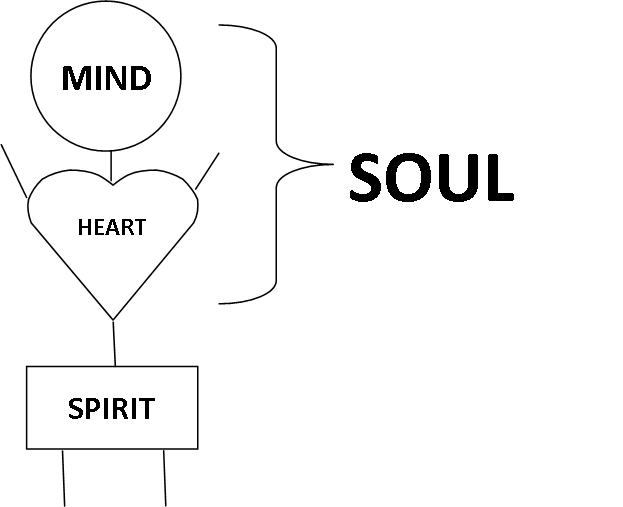Wicked Thoughts and How to Deal with Them
There’s somebody living in your body. This somebody is a multifaceted, non-physical, very real entity. The Bible teaches us to separate our bodies from this invisible persona. Think of your body as an automobile that transports you—or, as a vessel: a jug that holds contents. We, as the born-again, will stand before the judgment seat of Christ to give an account of what we’ve done in our bodies.| Audio Options: | MP3 |
Wicked Thoughts and How to Deal with Them
Have you yet to be born again? Have you come to an understanding of the temporalness of this life? Are you becoming more and more unsatisfied with the world’s empty pleasures? Are you yearning for a fulfillment that’s larger than your supper plate and the clothes you wear? Would you like to start over with a brand new, sinless, shameless, eternal life? Things can change for you in one supernatural moment in ways you never dreamed possible. Jesus Christ is the Lord of Glory and stands by to meet you. Come on in. Click onto “Further With Jesus” for childlike instructions and immediate entry into the Kingdom of God. NOW FOR TODAY’S SUBJECT.
GOD SAID, Genesis 2:7:
And the LORD God formed man of the dust of the ground, and breathed into his nostrils the breath of life; and man became a living soul.
GOD SAID, Genesis 6:5:
And God saw that the wickedness of man was great in the earth, and that every imagination of the thoughts of his heart was only evil continually.
GOD SAID, Psalms 77:6:
I call to remembrance my song in the night: I commune with mine own heart: and my spirit made diligent search.
GOD SAID, Proverbs 4:23:
Keep thy heart with all diligence; for out of it are the issues of life.
MAN SAID: There is no soul or life after death. Your brain is the seat of all consciousness. When you die, your brain dies and it’s over—with no judgment or “hell” to fear.
Now THE RECORD: There’s somebody living in your body. This somebody is a multifaceted, non-physical, very real entity. Jesus declares this inner structure in Matthew 22:37-38:
37 Jesus said unto him, Thou shalt love the Lord thy God with all thy heart, and with all thy soul, and with all thy mind.
38 This is the first and great commandment.
He describes this inner persona as threefold: Heart, soul, and mind. The body houses and facilitates these three.
The Bible teaches us to separate our bodies from this invisible persona. Think of your body as an automobile that transports you—or, as a vessel: a jug that holds contents. We, as the born-again, will stand before the judgment seat of Christ to give an account of what we’ve done in our bodies. These curious words are written in II Corinthians 5:10:
For we must all appear before the judgment seat of Christ; that every one may receive the things done in his body, according to that he hath done, whether it be good or bad.
We are commanded to learn how to possess our vessel in I Thessalonians 4:3-5:
3 For this is the will of God, even your sanctification, that ye should abstain from fornication:
4 That every one of you should know how to possess his vessel in sanctification and honour;
5 Not in the lust of concupiscence, even as the Gentiles which know not God:
Your body is your car—or your jug—and not who you are. Consider the account of Lazarus and the rich man in Luke 16:19-31:
19 There was a certain rich man, which was clothed in purple and fine linen, and fared sumptuously every day:
20 And there was a certain beggar named Lazarus, which was laid at his gate, full of sores,
21 And desiring to be fed with the crumbs which fell from the rich man''s table: moreover the dogs came and licked his sores.
22 And it came to pass, that the beggar died, and was carried by the angels into Abraham''s bosom: the rich man also died, and was buried;
23 And in hell he lift up his eyes, being in torments, and seeth Abraham afar off, and Lazarus in his bosom.
24 And he cried and said, Father Abraham, have mercy on me, and send Lazarus, that he may dip the tip of his finger in water, and cool my tongue; for I am tormented in this flame.
25 But Abraham said, Son, remember that thou in thy lifetime receivedst thy good things, and likewise Lazarus evil things: but now he is comforted, and thou art tormented.
26 And beside all this, between us and you there is a great gulf fixed: so that they which would pass from hence to you cannot; neither can they pass to us, that would come from thence.
27 Then he said, I pray thee therefore, father, that thou wouldest send him to my father''s house:
28 For I have five brethren; that he may testify unto them, lest they also come into this place of torment.
29 Abraham saith unto him, They have Moses and the prophets; let them hear them.
30 And he said, Nay, father Abraham: but if one went unto them from the dead, they will repent.
31 And he said unto him, If they hear not Moses and the prophets, neither will they be persuaded, though one rose from the dead.
The rich man’s body is in the rich man’s tomb. The rich man’s eyes are in the rich man’s tomb. The rich man’s tongue is in the rich man’s tomb. The rich man’s brain is in the rich man’s tomb. Yet, in Hell, his eyes look up; in Hell, he asks for water to cool his tongue; in Hell, he begins to reason with Abraham, who he sees afar off. The rich man’s body was in the rich man’s tomb, returning to dust, but in Hell, his soul was in torment. Note that death is separation from the God of life and not oblivion as some suppose.
This inside spiritual structure communicates on a spiritual plane with itself and with outside spirits. Our physical vessel was made to house the contents of the heart, soul, and mind. Not mentioned above is the spirit which resides in the belly: the spirit is life. There are three basic spirits we have to deal with: One, the spirit of man. Two, the spirit of life in Christ Jesus. Three, the evil, deadly spirit of Satan. When Jesus speaks about the Holy Spirit that He promised to fill his servants with, He makes this telling statement in John 7:38-39:
38 He that believeth on me, as the scripture hath said, out of his belly shall flow rivers of living water.
39 (But this spake he of the Spirit, which they that believe on him should receive: for the Holy Ghost was not yet given; because that Jesus was not yet glorified.)
The spirit dwells in the belly. The spirit is life, not just life’s energy, but knowing life that leads and guides. Again speaking of the Holy Ghost, Jesus speaks in John 14:26:
But the Comforter, which is the Holy Ghost, whom the Father will send in my name, he shall teach you all things, and bring all things to your remembrance, whatsoever I have said unto you.
Regarding the spirit of man, Proverbs 20:27:
The spirit of man is the candle of the LORD, searching all the inward parts of the belly.
Please note that the separation of soul and spirit is a very difficult thing and this writer does not pretend to know it all. Hebrews 4:12 emphasizes the difficulty:
For the word of God is quick, and powerful, and sharper than any twoedged sword, piercing even to the dividing asunder of soul and spirit, and of the joints and marrow, and is a discerner of the thoughts and intents of the heart.
Heart, soul, mind, and spirit interact within the body in a very interesting way. Consider the stick figure below:

The Word of God tells us that out of the heart proceed the issues of life and we are cautioned to protect it. Proverbs 4:23:
Keep thy heart with all diligence; for out of it are the issues of life.
The spirit that dwells in the belly leads and guides. The spirit of man dwells in the belly and man was created so that the Spirit of God would cohabitate with the spirit of man in the human vessel. I Corinthians 3:16:
Know ye not that ye are the temple of God, and that the Spirit of God dwelleth in you?
But Adam and Eve chose to reject the Spirit of God and to embrace the spirit of Satan. Because of the fall of Adam and Eve, man comes into this world spiritually dead in trespasses and sin and has onboard a contaminated carnal spirit—thus the essential need to be born-again. God gives each man the opportunity to choose which spirit cohabitates. If you choose the Spirit of God, He will lead and guide in all truth. If you choose the spirit of Satan, he will lead and guide in all that is false and empty. The mind of man is lead and guided by the spirit he has chosen.
The soul is the knowing you. It is the soul that needs to be saved. Hebrews 10:39:
But we are not of them who draw back unto perdition; but of them that believe to the saving of the soul.
James 1:21:
Wherefore lay apart all filthiness and superfluity of naughtiness, and receive with meekness the engrafted word, which is able to save your souls.
A simple example of internal interaction would look like this: Keep in mind that thoughts are spiritual entities. They are spiritually formed. You do not create thoughts. Each thought—good or evil—that one thinks is not new or unique. It has been thought millions of times before. A thought enters the mind—in many cases audibly through the ear. The spirit in the belly leads and guides. If the thought is evil and the Spirit of God is in the belly, it will lead the mind to reject the evil thought and cast it out the other ear. If the thought is good and the Spirit of God is in the belly, it will lead the mind to embrace the good thought. When the thought is embraced, a “trap door” opens up under the chin and that thought falls down into the heart, from which flows the issues of life. If the thought is evil and the spirit of the devil is in the belly, it will lead the mind to embrace the evil thought. When embraced, the “trap door” under the chin opens up and the evil thought falls down into the heart, contaminating the heart with death. If the thought is good, the spirit of Satan will lead the mind to reject it and to eject the good thought from the mind of consideration.
Man has been given the opportunity to choose which outside spirit—whether it be good or evil—he will cohabitate with. Deuteronomy 30:15-19:
15 See, I have set before thee this day life and good, and death and evil;
16 In that I command thee this day to love the LORD thy God, to walk in his ways, and to keep his commandments and his statutes and his judgments, that thou mayest live and multiply: and the LORD thy God shall bless thee in the land whither thou goest to possess it.
17 But if thine heart turn away, so that thou wilt not hear, but shalt be drawn away, and worship other gods, and serve them;
18 I denounce unto you this day, that ye shall surely perish, and that ye shall not prolong your days upon the land, whither thou passest over Jordan to go to possess it.
19 I call heaven and earth to record this day against you, that I have set before you life and death, blessing and cursing: therefore choose life, that both thou and thy seed may live:
Are there really good and evil spirits and do I have one or more? Are these Biblical truths, written thousands of years ago, actually supported by today’s vaunted science? The field of psychology has wrestled with the reality of indwelling evil thoughts and has struggled with ways to contend with them. The cover of the October 2015 issue of Psychology Today reads, “Wicked Thoughts,” with the subhead of “How to deal with your worst impulses.” The feature begins with a two-page spread with a full page of it dedicated to a large jar with a large, coiled, and ready-to-strike venomous serpent. This symbolism is not lost on students of the Scriptures. Satan possesses a serpent and communicates his evil thoughts to our grandmother Eve. She embraced this evil spirit. Now fast forward to today.
A major headline inside this feature, written by Jena Pincott, reads, “Our unvoiced thoughts can scare and shame us, but we get off on cheap thrills and the misery of others.” Subsections of the feature are headlined with words like “morbid, creepy thoughts,” “sexually perverse thoughts,” “prejudiced thoughts,” “schadenfreude,” and “violent, murderous thoughts.”
Several paragraphs from the feature follow:
It’s surprising how little control we seem to have over the timing and content of “bad” thoughts. In a landmark experiment back in the 1980s, psychologist Eric Klinger, of the University of Minnesota, asked volunteers to record what they were thinking whenever a handheld device chirped over the course of a week. Within a 16-hour day, he found, people have about 500 thoughts that are unintentional and “intrusive” and that last about 14 seconds on average. While most dealt with the concerns of everyday life, 18 percent were unacceptable, uncomfortable, or just plain bad—politically incorrect or mean thoughts. A remaining 13 percent were ugly, out of character, or downright shocking—say, murderous or perverse ideas.
The Swiss psychiatrist Carl Jung was among the first to grapple deeply with wicked thoughts. In his Psychology of the Unconscious, he observes that every person has a “shadow self.” This self, he explains, is the unconscious part of our psyche, a repository of base animal instincts and dark desires. We repress it—but only for so long before “a possible outburst.”
Where does this dark side come from? The part of the mind we don’t identify with and over which we have little say. If, as neuroscience often describes it, a set of cognitive processes gives rise to the “I” that we think of as ourselves—our normal, decent, rational side—other processes must give rise to a darker, irrational mind, in which intrusive thoughts lurk.
Klinger’s theory is that a “preconscious” mechanism in the brain is always scanning the environment for underlying concerns and cues that tap into our emotions. When it encounters a trigger, a renegade thought bursts seemingly out of nowhere. The neuroscientist Sam Harris calls these thoughts “random,” and completely out of our control. In Free Will, he writes, “The idea that we as conscious beings are deeply responsible for the character of our mental lives and subsequent behavior is simply impossible to map onto reality.”
What these scenarios inspire is schadenfreude, German for “joy-pain,” the primal pleasure in another’s misfortune. “To savor schadenfreude is diabolic,” Schopenhauer once said.
The thought itself might be shocking, but having it isn’t unusual. If having murderous thoughts were a crime, nearly all of us—91 percent of men and 84 percent of women—would be guilty, reports evolutionary psychologist David Buss, author of The Monster Next Door and a professor at the University of Texas at Austin.
In an added twist, some people torment themselves with worst-case scenarios in which they’ve lost control, like swerving their car into oncoming headlights or dropping their precious baby from the 13th-floor balcony. These disturbing ideas, often brought on by stress, may upset us so much that we become more vigilant to keep ourselves in check; with too much vigilance, however, thoughts may tip into obsessions.
Finally, the feature discusses one of the most renowned in the field of psychology, Carl Jung:
Jung’s outlet for his most troubling thoughts was his journal, later published as The Red Book. In one of many dream-like scenes, he encounters a red horse-man. Its presence is discomfiting, but Jung doesn’t ignore or deny it. He and the “red one” talk, quarrel, dance. Afterward, he experiences an odd sense of joy. The exchange feels like reconciliation.
“Surely this red one was the devil,” he realizes, “but my devil.” [End of quotes]
Don’t be surprised that academia always ends up here at the Word of God. In the feature we just reviewed, they discuss various professional but disparate opinions on how to deal with the evil that is living in the body of humans. The Word of the Creator describes this dimension in detail and offers the solution, but His solution is absent from the discussion.
The solution is simple, and Jesus lays it out in John 3:3:
Jesus answered and said unto him, Verily, verily, I say unto thee, Except a man be born again, he cannot see the kingdom of God.
We must be born a second time—this time of the Spirit of God. At this point, we become sons and daughters of God and the mind renewal process begins in earnest. Consider just a handful of verses. Note the curious grouping of words:
• II Corinthians 10:3-6:
3 For though we walk in the flesh, we do not war after the flesh:
4 (For the weapons of our warfare are not carnal, but mighty through God to the pulling down of strong holds;)
5 Casting down imaginations, and every high thing that exalteth itself against the knowledge of God, and bringing into captivity every thought to the obedience of Christ;
6 And having in a readiness to revenge all disobedience, when your obedience is fulfilled.
• Romans 12:1-2:
1 I beseech you therefore, brethren, by the mercies of God, that ye present your bodies a living sacrifice, holy, acceptable unto God, which is your reasonable service.
2 And be not conformed to this world: but be ye transformed by the renewing of your mind, that ye may prove what is that good, and acceptable, and perfect, will of God.
• Philippians 4:6-8:
6 Be careful for nothing; but in every thing by prayer and supplication with thanksgiving let your requests be made known unto God.
7 And the peace of God, which passeth all understanding, shall keep your hearts and minds through Christ Jesus.
8 Finally, brethren, whatsoever things are true, whatsoever things are honest, whatsoever things are just, whatsoever things are pure, whatsoever things are lovely, whatsoever things are of good report; if there be any virtue, and if there be any praise, think on these things.
In Christ Jesus, the process of renewal is ongoing, where evil is overcome by good. Keep your heart!
GOD SAID, Genesis 2:7:
And the LORD God formed man of the dust of the ground, and breathed into his nostrils the breath of life; and man became a living soul.
GOD SAID, Genesis 6:5:
And God saw that the wickedness of man was great in the earth, and that every imagination of the thoughts of his heart was only evil continually.
GOD SAID, Psalms 77:6:
I call to remembrance my song in the night: I commune with mine own heart: and my spirit made diligent search.
GOD SAID, Proverbs 4:23:
Keep thy heart with all diligence; for out of it are the issues of life.
MAN SAID: There is no soul or life after death. Your brain is the seat of all consciousness. When you die, your brain dies and it’s over—with no judgment or “hell” to fear.
Now you have THE RECORD.
References:
Authorized King James Version
Pincott, J., “Wicked Thoughts,” Psychology Today, October 2015
Additional Audios
- The 6,000s (Part 4: Adam & Eve Found; They Are Young!)
- Meditation Rebuilds Grey Matter in 8 Weeks (My Soul is Continually in My Hand)
- Fasting and Prayer--The Power that Breaks the Yoke
- The Worms from Hell
- The Truth Remains True — Pigs — Lot’s Wife — Flush It
- Why the Blood of Jesus?
- Dead Men Talking About Life After Death
- Heaven--Looking for Proof? (Let There Be No Doubt!)
- Wicked Thoughts and How to Deal with Them
- Sodom and Gomorrah
- Forty-Eight Hours In Hell
Power Verse
1 Samuel 15:22 (KJV)
And Samuel said, Hath the Lord as great delight in burnt offerings and sacrifices, as in obeying the voice of the Lord? Behold, to obey is better than sacrifice, and to hearken than the fat of rams.







